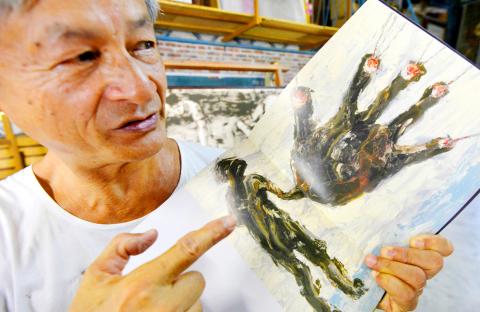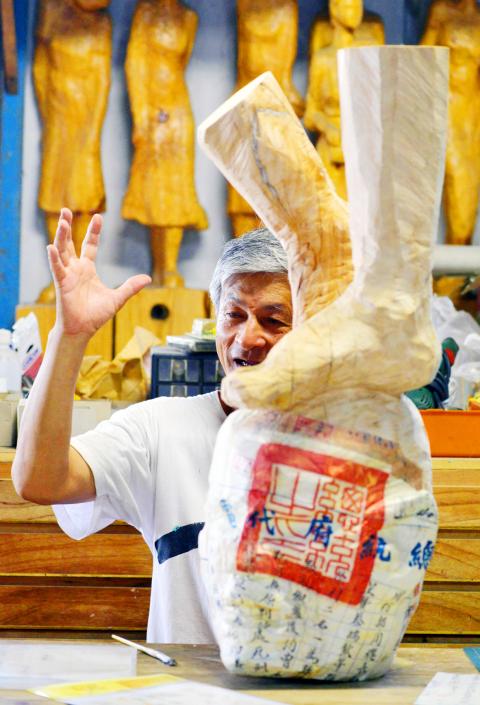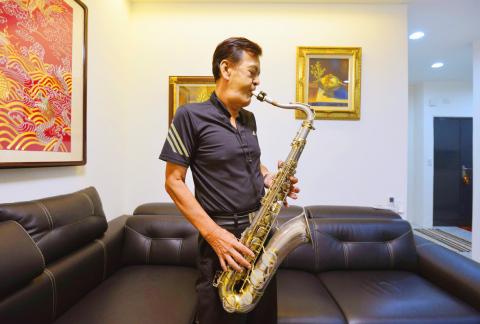When saxophonist Chen Shen-ching (陳深景) was jailed during the White Terror political purges, it was music that helped him hold on to his sanity.
Banned from taking his instrument into prison he scrawled songs on scraps of paper and memorized them during his 12 years behind bars.
As Taiwan prepares to mark 30 years since martial law was lifted and it began its journey to become a vibrant democracy, Chen is one of a number of creative Taiwanese who want to ensure those dark days are never forgotten.

Photo: Sam Yeh, AFP
Now 75, he continues to sing his prison songs at political rallies and human rights events.
“I hope people will listen, sing them and want to learn more about White Terror history,” Chen said.
At 32, with a promising musical career and a young family, Chen was given a life sentence for sedition after joining a group advocating Taiwanese independence — taboo under Chiang Kai-shek’s (蔣介石) regime.

Photo: Sam Yeh, AFP
His father died soon after he was arrested and he penned a tribute song to help him through his grief.
“I taught others to sing it and we often cried,” Chen said. “For a musician, playing a sad song helps release emotions.”
He composed 20 songs in jail reflecting inmates’ homesickness and mental anguish.

Photo: Sam Yeh, AFP
Chen was freed in 1986 as part of a prison amnesty and slowly managed to rebuild his life in southern Taiwan. He still often performs at pro-Taiwan independence rallies.
Chen is glad he never wavered from his beliefs.
“I did what I did for my ideals,” he said. “So, I have no regrets.”
Chiang fled to Taiwan in 1949 after losing the civil war to the Chinese communists, but saw himself and his authoritarian government as the legitimate rulers of the whole of China. Under his rule, political opponents were killed and imprisoned, there was no free press and songs deemed vulgar or pro-communist were banned.
Official records state about 140,000 people were tried by military courts, with as many as 8,000 executed during the 38-year crackdown. Many believe the actual numbers are higher.
Chen Wu-jen (陳武鎮) was jailed at the age of 20 for sedition after scribbling anti-government phrases on the back of an aptitude test for new military conscripts as he was about to start his compulsory service.
Released after two years, he took up art teaching, but only painted portraits and landscapes for fear of being imprisoned again.
After martial law was lifted by Chiang’s son Chiang Ching-kuo (蔣經國) on July 15, 1987, he was able to truly express himself for the first time.
Since then, almost all his creations revolve around the White Terror.
“I regret what I did,” Chen Wu-jen, 68, said at his studio in Tainan. “But as an artist I feel lucky because this experience has given me a profound subject to work on.”
His sculpture series The Verdicts is a collection of large skulls made from wood, pasted with photocopied sentencing documents. Clawing hands stretch out from the skulls while feet trample them.
His paintings depict a woman screaming in front of a train, another suffering a miscarriage and being dragged by her hair through a pool of blood. He lends his works to exhibitions, but does not sell them —some are currently on display in a former dissidents’ prison on Green Island (綠島), which has been converted to a human rights center.
“I think artists’ depictions of a historical event leave a deeper impression on people than historians’ narratives,” Chen Wu-jen said. “I hope my works will have some impact.”
The Democratic Progressive Party (DPP) has organized a music festival featuring young bands performing previously banned songs as part of this weekend’s commemorations of the end of martial law.
There will also be an exhibition of banned books, magazines and albums. The DPP has its roots in the political movement that opposed the Chiangs, and former rebels have become top officials and lawmakers.
The young musicians singing at the festival were mostly born after 1987, but say they want to play a part in keeping history alive.
Bassist and songwriter Mickey Yu (尤寶), 32, of hip-hop band Community Service (勞動服務) said his grandfather was beaten during White Terror interrogations, although never convicted.
His group will sing their own political compositions, as well as previously banned song Hometown at Dusk (黃昏的故鄉)” — popular with those who were blacklisted and forced to live overseas during the purges.
“History definitely cannot be forgotten,” Yu said. “It should be a lesson for all.”

The inspection equipment and data transmission system for new robotic dogs that Taipei is planning to use for sidewalk patrols were developed by a Taiwanese company, the city’s New Construction Office said today, dismissing concerns that the China-made robots could pose a security risk. The city is bringing in smart robotic dogs to help with sidewalk inspections, Taipei Deputy Mayor Lee Ssu-chuan (李四川) said on Facebook. Equipped with a panoramic surveillance system, the robots would be able to automatically flag problems and easily navigate narrow sidewalks, making inspections faster and more accurate, Lee said. By collecting more accurate data, they would help Taipei

STATS: Taiwan’s average life expectancy of 80.77 years was lower than that of Japan, Singapore and South Korea, but higher than in China, Malaysia and Indonesia Taiwan’s average life expectancy last year increased to 80.77 years, but was still not back to its pre-COVID-19 pandemic peak of 81.32 years in 2020, the Ministry of the Interior said yesterday. The average life expectancy last year increased the 0.54 years from 2023, the ministry said in a statement. For men and women, the average life expectancy last year was 77.42 years and 84.30 years respectively, up 0.48 years and 0.56 years from the previous year. Taiwan’s average life expectancy peaked at 81.32 years in 2020, as the nation was relatively unaffected by the pandemic that year. The metric

TAKING STOCK: The USMC is rebuilding a once-abandoned airfield in Palau to support large-scale ground operations as China’s missile range grows, Naval News reported The US Marine Corps (USMC) is considering new sites for stockpiling equipment in the West Pacific to harden military supply chains and enhance mobility across the Indo-Pacific region, US-based Naval News reported on Saturday. The proposed sites in Palau — one of Taiwan’s diplomatic allies — and Australia would enable a “rapid standup of stored equipment within a year” of the program’s approval, the report said, citing documents published by the USMC last month. In Palau, the service is rebuilding a formerly abandoned World War II-era airfield and establishing ancillary structures to support large-scale ground operations “as China’s missile range and magazine

Passengers on Taiwan High Speed Rail (THSR) will be required to use headphones and make phone calls in gangways under new “quiet travel” rules starting Sept. 22. THSR Chairman Shih Che (史哲) told media that THSR will run a three-month promotional campaign to ensure widespread adoption of the new rules. Those repeatedly ignoring the guidance face the potential termination of their transport contract, which can result in them getting escorted off the train, according to THSR. Shih shared his hope to cultivate an environment conducive to rest and reading for the train’s passengers, stating that these changes aim to “promote self-discipline” among passengers